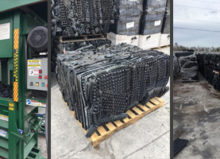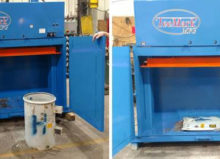Our GP1500C Glass Pulverizer Helping Municipalities Save Money and Reduce Glass Waste
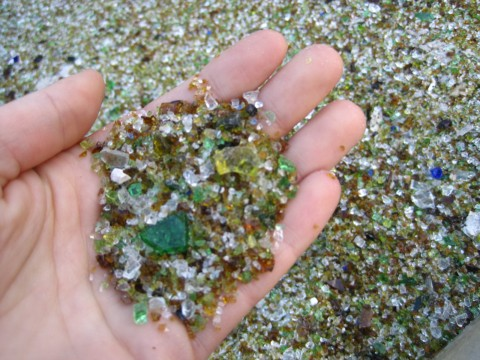
As recycling and landfill tipping fees increase, one Tennessee city has turned to recycling glass in-house to save money while still staying green. The cost of recycling glass via private firms and businesses has gone up, leading some cities to forgo recycling glass in favor of dumping it in landfills, which has become cheaper than recycling. Zach Wilkinson, director of public works for the city of Gallatin, said his city was one of many municipalities facing cost issues when it comes to glass recycling.
“I think a lot of communities are facing a similar issue with glass,” Wilkinson said. “The demand for it in the market has disappeared over the last several years. It costs more to send it off to be recycled than to just landfill it, which was the situation we were in. It was really obvious to me that it wasn’t cost effective to haul the glass and then pay a higher tipping fee to have it recycled.”
While putting glass in a landfill was cheaper in the short term, Wilkinson said he didn’t want to do something that wasn’t sustainable in the long-term. “If we had hauled it a quarter of the distance, we could have put it in a landfill for cheaper,” he said. “Justifying that extra cost was a hard thing to do, but I didn’t want to landfill anything we didn’t have to. So we started researching an alternative that would help us stay green but also make things more financially palatable.”
According to the Glass Packaging Institute, glass is a 100 percent recyclable product allowing for both the reduction of emission, saving energy, and reusing raw materials such as sand, soda ash, limestone and “cullet,” the industry term for furnace-ready recycled glass.
Despite the fact the material can be reused, very few municipalities and government entities process glass themselves. Even some major metro areas do not have glass recycling equipment. In 2016, the city of Metro Nashville reported it was still hauling recycled glass to a facility in Atlanta which charged $38.50 per ton, more than $87,000 in annual cost to the city.
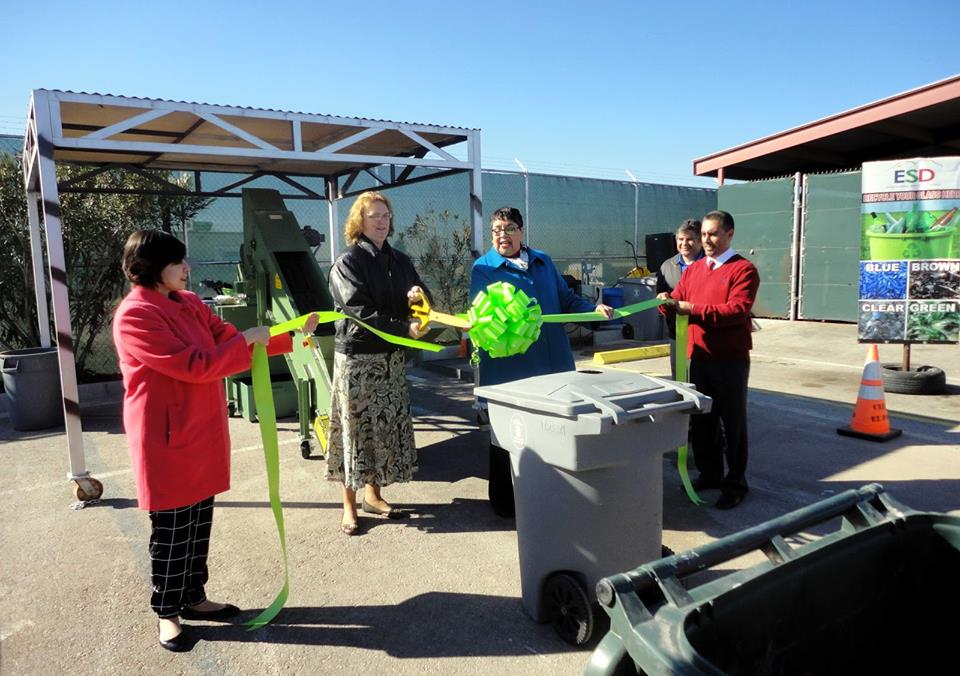 In February 2017, the city of Gallatin received a $25,000 recycling equipment grant from the Tennessee Department of Environment and Conservation (TDEC) toward the purchase of the glass pulverizer. Wilkinson said the grant covered half of the material cost of the crusher. City employees helped construct the building located over the pulverizer and the pit below it, which also saved money.
In February 2017, the city of Gallatin received a $25,000 recycling equipment grant from the Tennessee Department of Environment and Conservation (TDEC) toward the purchase of the glass pulverizer. Wilkinson said the grant covered half of the material cost of the crusher. City employees helped construct the building located over the pulverizer and the pit below it, which also saved money.
Planning ahead on where to position the machine paid off. “We spent a lot of time thinking about where we should put it to make the process as streamlined as possible,” Wilkinson said. “I am really pleased with how that turned out. We took a lot of time to plan it out, including how we wanted to load it and where we wanted things to fall out. We’ve made a few adjustments to the setup since things were installed, but for the most part our installation has worked out really well.”
Wilkinson said learning how to operate the machine was a bit of a challenge. “When we started looking into applying for grants, I was looking for some local communities to talk to about glass recycling,” he said. “There weren’t really any that were doing it. Most every community I talked to was located in the Northeast or Southwest. Nashville sends theirs off to be crushed and most other cities sent it off to a private firm to deal with. We’ve had to fine tune how we process the glass. At first we were probably putting a little too much product into it just to see how much it could handle. We have actually created a way that we clean it regularly so it’s not as maintenance intensive and the best way to feed it.”
Like most recycling programs, Gallatin accepts only food grade glass for processing. Window panes, ovenware, Pyrex, crystal, light bulbs, and similar materials are not manufactured in the same way as traditional glass and therefore have to be recycled differently. Wilkinson said the city has also learned through trial and error what works and what doesn’t.
“There are certain things you don’t want to process, like glass that has candle wax in it,” he said. “Those don’t do well in it. There are certain size objects you don’t want to stick in the crusher because they clog things up. We mainly accept glass bottles, food jars, and those sort of things.”
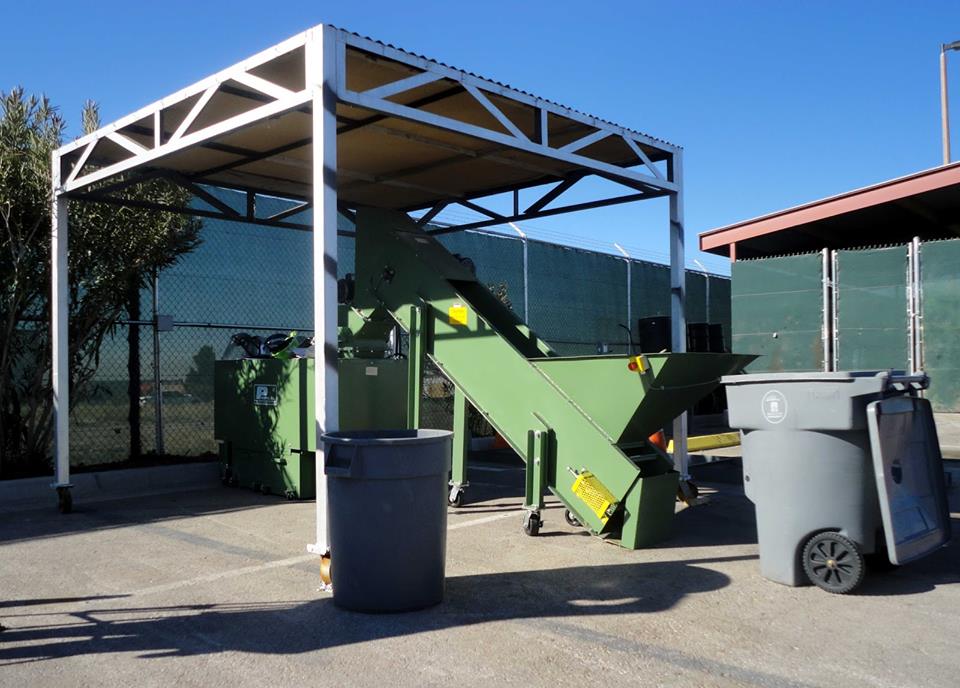 Wilkinson said city employees use a loader to feed the glass into a hopper that leads to the pulverizer. A rake is then used to pull the individual bottles into the crusher. Wilkinson said there are three main products from the pulverizer.
Wilkinson said city employees use a loader to feed the glass into a hopper that leads to the pulverizer. A rake is then used to pull the individual bottles into the crusher. Wilkinson said there are three main products from the pulverizer.
“The first things that come out are byproducts like the labels and metal caps,” he said. “We dispose of that. It then produces two sizes of glass: an eighth inch and another size that’s like sand it is so fine. Once it gets down to that eighth-of-an-inch size it won’t cut you. That was a concern for us because knowing we wanted to use it in construction projects we didn’t want to make something that would harm our employees when they were working. We were surprised at how safe it is to handle.” Wilkinson said the public works department is working in conjunction with the city of Gallatin’s Street Department to find uses for the recycled glass. Others have also expressed interest in the product.
“Because we operate our streets department out of the same facility as our recycling center, it made sense to find a way to use it in-house,” he said. “The crushed aggregate can be used for construction projects. So far, we’ve used it as backfill for a house basement on city property and then used some for drainage backfill. We’ve also been seeing a lot of local interest for it from contractors and even the local concrete plant to buy the material to use it in specialty projects. We’ve got a few of our own experimental projects going on to see how it looks when mixed into concrete. We are excited to see how it works out.”
The interest in the recycled glass produced by the city may also help recoup some of the costs. “We’ve heard people talk about using it from everything from landscaping mulch to mixing in concrete,” Wilkinson said. “We may eventually start selling the product because of the demand, which is very encouraging. Some cities want us to start crushing glass for them. We want to have our own process nailed down first and have the manpower before we do that. We also would have to charge for the extra manpower that we would need.”
Other communities are also taking notice of Gallatin’s success.
“I have been surprised at how many communities are calling to ask about how we are doing it,” Wilkinson said. “I think a lot of cities are looking into this. We’ve had some want to come see our set up. We’ve sort of been the guinea pigs.”
The City of El Paso, TX:
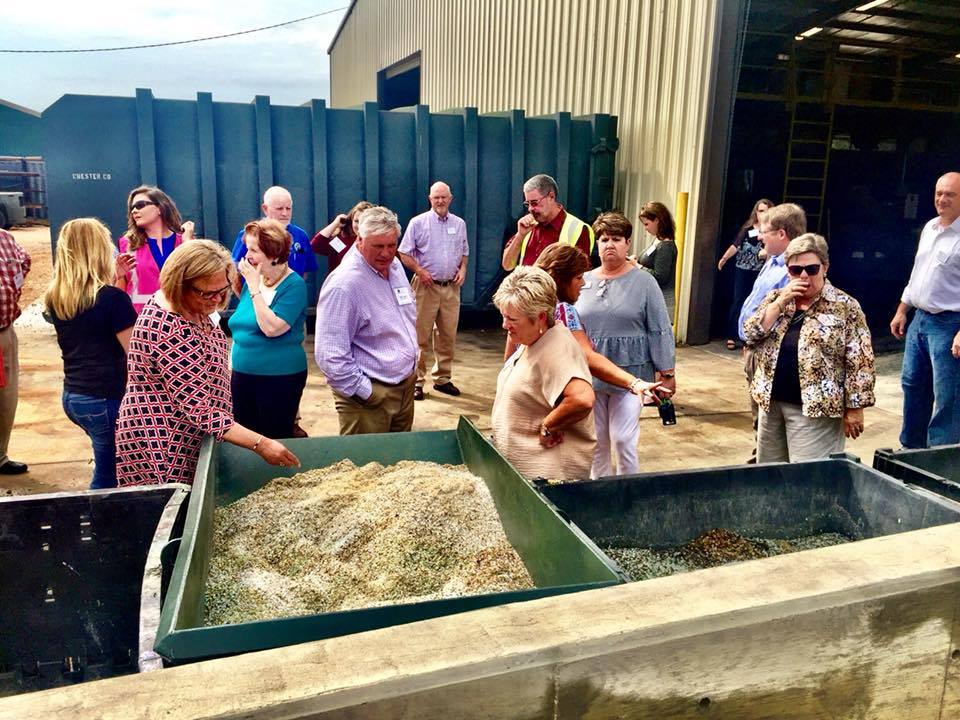 The City of El Paso is now officially in the glass recycling business even if it is just a pilot program. Rep. Lily Limón, Environmental Services Director, Ellen Smyth, and other dignitaries were on hand to launch the new recycling program at the Pendale Citizen Collection Station.
The City of El Paso is now officially in the glass recycling business even if it is just a pilot program. Rep. Lily Limón, Environmental Services Director, Ellen Smyth, and other dignitaries were on hand to launch the new recycling program at the Pendale Citizen Collection Station.
All El Pasoans will be able to drop-off their glass beverage bottles and jars at their neighborhood collection stations. (No window panes, automobile windshields, ceramics or glass figurines please.) The bottles will be taken to the Pendale Station where they will be pulverized. The resulting powder or beads may be used as mulch, road bedding, arts and crafts, etc.
County of Chester TN:
 We have a fresh batch of crushed glass available for FREE at our 315 Talley Store Rd location! Just bring your own containers!
We have a fresh batch of crushed glass available for FREE at our 315 Talley Store Rd location! Just bring your own containers!
The glass is crushed in our glass crusher and turned into these pebble-like pieces and sand. The edges are not sharp and will not cut you. Looks great in landscaping!
Fishers Island, NY
The Fishers Island Waste Management District (FIWMD) has been looking for viable solutions to help reduce the amount of waste that is shipped off the island. One of the areas of concern is the amount of bottles and cans that are sent off. While the flow in the off seasons slows down, during the summer months, a thirty-yard dumpster will fill in a day and a half. The bottle and can dumpsters are the highest quantity of dumpsters sent out each month. In an effort to reduce this, the District recently purchased a glass grinding machine. This machine will grind the glass down to both 1/8” and 3/8” particles. The glass can then be used as a clean fill. Taking the glass out of the trash flow will help reduce the quantity of dumpsters leaving the island and also put the glass to good use.
Crushed Glass Fun Facts:
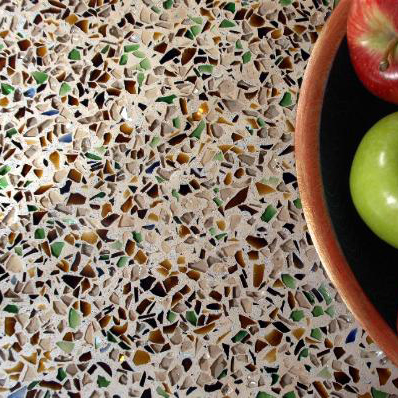 As a base material, recycled glass enhances the performance of gravel in an aggregate mix and, in some cases, stands alone as a base.
As a base material, recycled glass enhances the performance of gravel in an aggregate mix and, in some cases, stands alone as a base.
Unlike wood, glass mulch doesn’t absorb moisture, which improves water delivery while reducing the frequency of watering.
Recycled glass is used to make “glassphalt,” a material that is applied to roads, highways and even airport runways to make these surfaces less slippery and less prone to cracking.
Glass bottles and jars can be ground up to be used as a substitute for sand and crushed gravel for paving and construction purposes. Glass pulverized to the consistency of sand as aggregate for asphalt paving projects. Glass ground to a pellet-like consistency can be used in place of crushed gravel as drainage back fill material for foundation drains, retaining walls, utility trenches, and base courses for concrete slabs.

